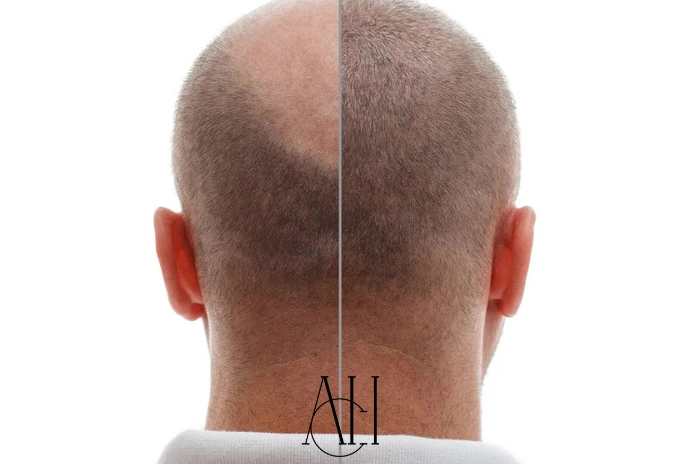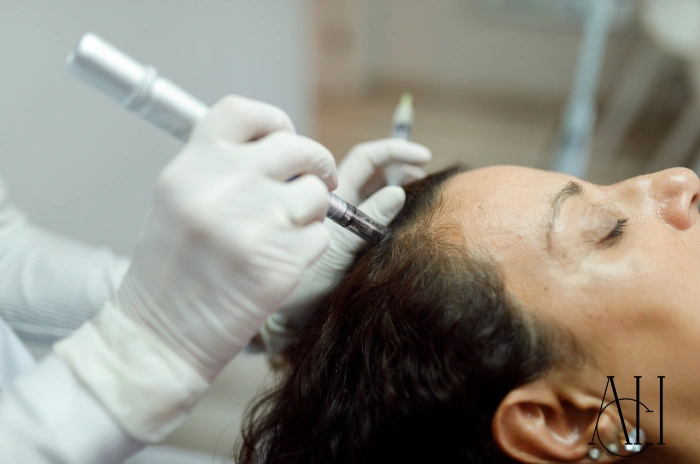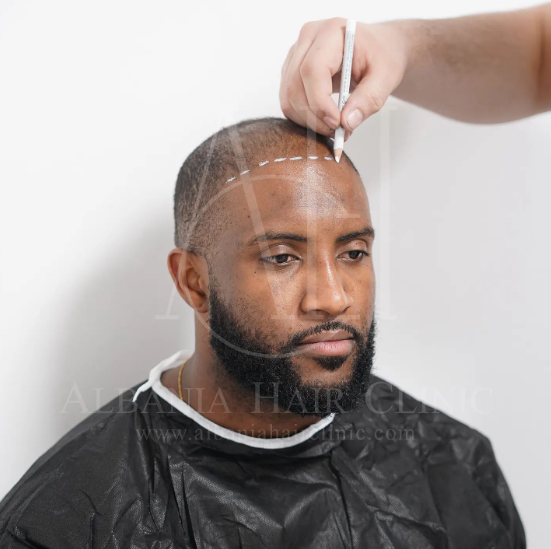When it comes to improving the hairline or reducing forehead size, two popular options are available: hair transplant and hairline lowering surgery. While both procedures aim to give a more balanced and youthful appearance, they are different in how they work and who they are suitable for. In this guide, you’ll learn the differences, benefits, and what to expect from each option so you can choose the one that best fits your goals.
Table of Contents
ToggleWhat is hairline lowering?
Definition and Purpose
Hairline lowering is a surgical procedure that moves the hairline forward. It reduces the size of the forehead and gives the face a more balanced look. The surgery is also called forehead reduction surgery.
How It Works
During the procedure, the surgeon removes a portion of the forehead skin and pulls the scalp forward. This lowers the hairline and shortens the forehead area.
What are the benefits of hairline lowering?
Improved Facial Proportions
Hairline lowering helps make the face look more balanced by reducing a high or large forehead. This can improve self-confidence, especially for women with naturally high hairlines.
Immediate Results
One of the main advantages of hairline lowering is that the results are visible right after the surgery. Although some healing time is needed, the change in hairline is immediate.
Who are the best candidates for hairline lowering?
Ideal Candidates
-
People with a naturally high hairline
-
Those with flexible scalp skin
-
Women with no hair loss issues
-
People who want quicker results than a transplant
Who Should Avoid It?
People with active hair loss, tight scalps, or those who form thick scars may not be suitable for this surgery.
What to expect on the day of hairline lowering surgery
Preparation and Process
You’ll meet with your surgeon to review the plan. The procedure is done under local or general anesthesia. The surgery usually takes 2–3 hours.
After Surgery
You’ll wear a bandage around your head, and mild swelling is normal. Most patients go home the same day.
Hairline lowering recovery
Recovery Timeline
-
Days 1–3: Swelling and mild pain
-
Week 1: Stitches removed, resume light activities
-
Week 2–4: Most healing complete, return to work
Post-Surgery Care
Keep the area clean, avoid intense exercise, and follow your surgeon’s advice. Use cold packs to reduce swelling.
Is Hairline Lowering Right For You?
Things to Consider
Hairline lowering is best for people with a high forehead but no hair thinning. If you’re losing hair or have a family history of baldness, a transplant may be better.
Consultation Is Key
A professional consultation helps decide which treatment suits your scalp type, goals, and hairline condition.
Albania Hair Clinic – Trapianto Capelli in Albania (@albaniahairclinic)’in paylaştığı bir gönderi
Your Hairline Lowering Procedure
Surgical Steps
-
Mark the new hairline
-
Remove a strip of forehead skin
-
Move the scalp forward
-
Close the incision with stitches
Safety and Results
The procedure is safe with a trained surgeon. The scar is usually hidden under the hairline and fades over time.
What Is Scalp Lowering?
Definition
Scalp lowering is another term for hairline lowering. It involves surgically moving the scalp to reduce forehead size.
Differences from Hair Transplant
Unlike a hair transplant, scalp lowering does not add new hair. It moves the existing hairline forward to give a fuller look.
Benefits of Hairline Lowering
Quick and Effective
Hairline lowering offers fast results. It can lower the hairline by up to 2–3 centimeters in one surgery.
No Graft Limitations
Unlike transplants, you don’t need a donor area. There’s no limit based on how many hair grafts you have.
WHAT IS FOREHEAD REDUCTION SURGERY?
Another Name for Hairline Lowering
Forehead reduction surgery is the same as hairline lowering. It is used to reduce a high forehead and bring harmony to facial features.
Popular Among Women
Many women with naturally high hairlines choose this surgery to frame the face better and create a more feminine appearance.
WHAT TO EXPECT FROM A FOREHEAD REDUCTION PROCEDURE
Surgery Day Overview
The procedure is done in a clinic or hospital. Local or general anesthesia is used. You may feel tightness after surgery, but this goes away within a few days.
Healing and Follow-Up
You’ll return for follow-up visits to check healing and remove stitches. Scars are hidden in the hairline and heal with time.
What Are the Benefits of Forehead Reduction Surgery?
Better Self-Image
People often feel more confident after forehead reduction. The face appears younger and more balanced.
One-Time Solution
Unlike hair transplants, which may need multiple sessions, hairline lowering is usually a one-time procedure with lasting results.

How Is Forehead Reduction Surgery Performed?
Detailed Process
-
The doctor marks the desired hairline
-
The forehead skin is lifted
-
Excess skin is removed
-
Scalp is lowered and stitched in place
Scarring and Healing
The scar is placed behind the new hairline and fades over time. Most patients are happy with how discreet the scar becomes.
What are the Goals of Hairline Lowering Surgery in Turkey?
Cosmetic Goals
In Turkey, many clinics aim to improve forehead shape and lower the hairline to match the patient’s facial features. The goal is natural, long-lasting results.
High-Quality Care
Turkey is known for skilled surgeons, modern clinics, and affordable prices. Many people travel to Turkey for hairline lowering surgery.
Comparing Your Hairline Lowering Options
Hairline Lowering vs. Hair Transplant
-
Hairline Lowering: Quick results, good for high foreheads, best for people without hair loss
-
Hair Transplant: Adds hair to thin or bald areas, better for people with hair loss
Combination Treatments
Some people choose both—hairline lowering for shape, and transplant for filling in thin spots. Your doctor can help design a custom plan.

Which Hairline Lowering Procedure Is Right For You?
Choosing the Best Option
Your choice depends on your goals, hair type, and scalp flexibility. If you want a lower forehead and don’t have hair loss, hairline lowering may be best.
Ask a Specialist
A consultation with a hair specialist or plastic surgeon can help you understand your options. Photos, scalp exams, and medical history all guide the decision.
Choosing between hair transplant and hairline lowering surgery depends on your personal needs and expectations. Hairline lowering gives fast, dramatic results for people with high foreheads and no hair loss. Hair transplant is better for those who need to fill in thinning or balding areas. In some cases, a combination of both treatments gives the best outcome. Talk to a qualified doctor to create the right plan for your hair and face.
Frequently Asked Questions
What is the main difference between hair transplant and hairline lowering?
Hair transplants add new hair to thin or bald areas, while hairline lowering moves the existing hairline forward to reduce forehead size. Each has a different goal and method.
Who is a good candidate for hairline lowering surgery?
People with a naturally high hairline, flexible scalp skin, and no hair loss are the best candidates for hairline lowering surgery.
Can I have both a hair transplant and hairline lowering?
Yes, some patients choose both procedures. Hairline lowering changes the forehead shape, while a transplant adds density or fills gaps.
How long does it take to recover from hairline lowering surgery?
Most people recover in 2 to 4 weeks. Stitches are removed after about a week, and swelling usually goes away within a few days.
Is hairline lowering surgery permanent?
Yes, the results of hairline lowering are permanent. However, it’s important to have the procedure done by an experienced surgeon for the best outcome.




